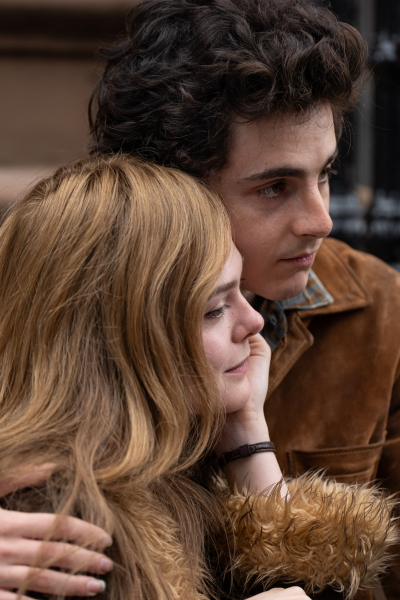
Bob Dylan is a musician who has, over the course of a more-than-six-decade-long career, staunchly defied categorisation. For that reason, Todd Haynes’s experimental 2007 biopic, I’m Not There – which tells the legendary singer’s story in six segments, with a string of actors adopting his mop of curly hair and signature dark shades – felt like a fittingly unconventional way to bring his life to the big screen.
James Mangold’s A Complete Unknown, on the other hand – the new musical reimagining of Dylan’s early years in New York, based on music historian Elijah Wald’s book Dylan Goes Electric!, in which he’s played by a softly-spoken, hollow-eyed Timothée Chalamet – is, for better and for worse, far more straightforward and accessible, inserting the Nobel Prize-winning icon into a more familiar, old-school narrative structure. In many ways, the result isn’t quite worthy of its enigmatic subject, but it also demands to be seen, if only for the virtuosic performance at its centre, as well as the incredible, frequently goosebump-inducing music which permeates this tale. Together, they make this flawed film pretty irresistible.
We first see Chalamet’s curmudgeonly, withdrawn young Dylan in 1961, as he’s stuffed into the back of a car hurtling towards Manhattan, aged 19. He’s left his midwestern hometown on a pilgrimage: his idol, the pioneering folk singer Woody Guthrie (Scoot McNairy), is recovering at a psychiatric hospital in nearby New Jersey, and he’s determined to meet him. Before you know it, he does, playing him a simple tune on his guitar – the elegiac “Song to Woody”, which would end up on Dylan’s self-titled debut album just a year later – and blowing him away, along with his visiting friend and fellow luminary, Pete Seeger (Edward Norton).
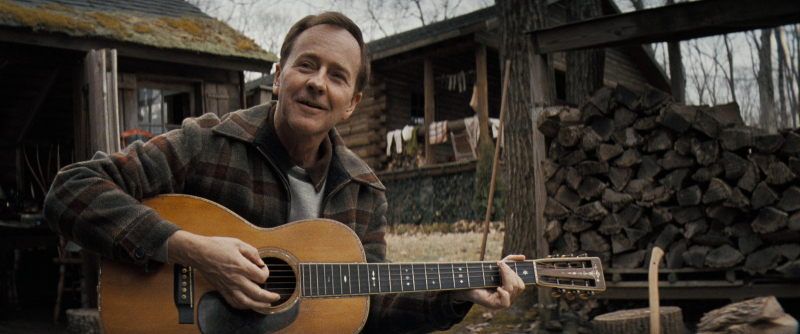
The latter takes the promising new talent under his wing, bringing him to low-lit, smoke-filled folk nights in Greenwich Village, where he encounters the more established faces already in that scene, including a mesmeric Joan Baez (the luminous Monica Barbaro). The pair are drawn to each other, but Bob also has his eye on another trailblazing firebrand: Sylvie Russo (a gentle Elle Fanning), an artist and civil rights activist who is a renamed version of Dylan’s girlfriend from that period, Suze Rotolo, she who appears with him on the cover of The Freewheelin’ Bob Dylan (the name change was apparently at the musician’s own behest).

These two relationships shape Bob’s career – with encouragement from Sylvie, he begins writing more music himself instead of covering classics; Joan sings his songs, raising his profile; he begins joining the latter on stage; and soon hits the big time. This is when the Bob we come to know – a shy and retiring presence, observant, truthful to a fault and already mistrustful of all the baggage which seems to accompany fame – slowly begins to retreat from his adoring public. As he’s mobbed by fans and cajoled by industry heavyweights, the sunglasses go on, and a new, slicker, tougher, more icy persona is constructed – a form of armour which seems essential to his survival.
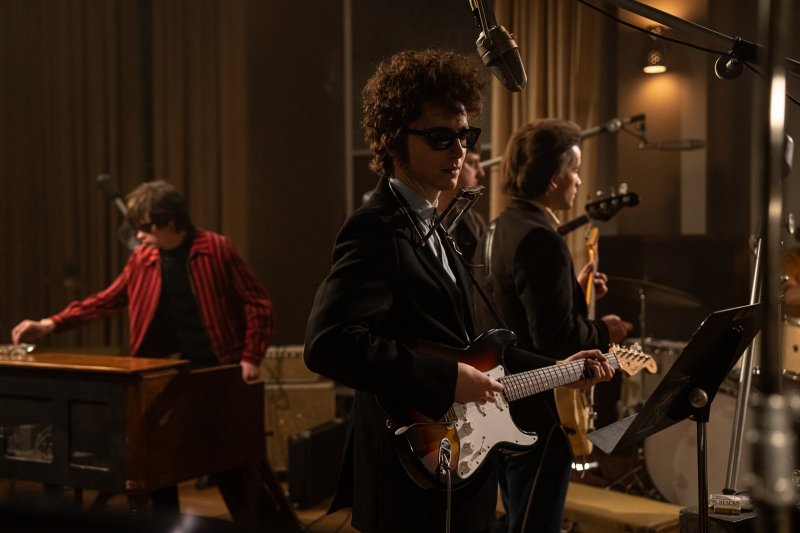
It all comes to a head at the 1965 Newport Folk Festival: with his sound having progressively evolved from loose and rustic on the likes of “Blowin’ in the Wind” and “The Times They Are a-Changin’” to more polished and electric-adjacent on “Like a Rolling Stone”, there’s confusion and anger in the audience. His peers, including Seeger, beg him not to betray his roots. But Bob, who has always gone his own way, refuses to cater to their whims.
We realise that he’s outgrown his past – outgrown these mentors, these audiences, these particular, genre-specific boxes executives have tried to squeeze him into, these expectations and responsibilities that have been placed on him by people to whom he owes nothing – and is ready to leave it behind. When he zooms off into the distance on his motorbike at the end of the film, you can feel him hurtling towards his future, one in which he still continues to grow and reinvent himself. Meanwhile, many of his contemporaries from this era, at least in our collective minds, remain frozen in time.
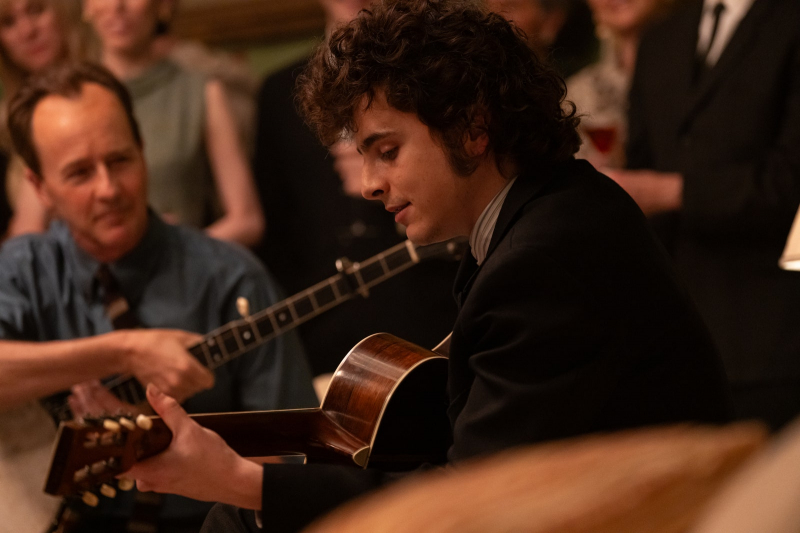
It’s a poetic conclusion to a film which frequently falters en route. Despite being set over the course of just four years, it’s a little too long, moves far too quickly and is overstuffed with incident – our understanding of people and relationships take a back seat in favour of much toing and froing between recording sessions, festivals, parties and TV appearances, with too many seemingly inconsequential interludes featuring minor supporting players, as if Mangold’s aim was to provide an almost comprehensive account of the period rather than an emotionally satisfying one. There are also far too many songs in A Complete Unknown – most are profoundly affecting, but a few ought to have been strategically trimmed.
This tendency to cram everything in also comes at the expense of nearly all of the characters, with the exception of Chalamet’s Dylan. There’s a certain flatness to Norton’s Pete, as well as Barbaro’s Joan and Fanning’s Sylvie. With the two women especially, while the seismic impact they had on Bob is clear, ultimately, they’re little more than sounding boards which allow us to learn more about him.
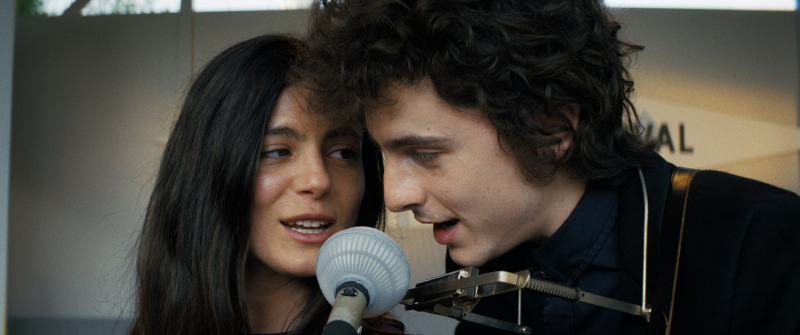
We only get glimpses of Sylvie’s activism, and it’s only significant in spelling out Dylan’s own political awakening, and in introducing the audience to the causes of that period. Through her prodding, we hear him articulate why, at least initially, he’s discouraged from recording his own original songs, and we witness him sharing surreal and possibly fabricated tales from his adolescence, reminding us that we actually know very little about his background. The lens is never really turned back on Sylvie – she remains an angelically beautiful, nearly saintlike support system, quietly jealous of Bob’s connection with Joan and almost always ready to abandon her own passions at the drop of a hat to be by his side.
Joan has more bite, though not much. When we first see her singing, her genius is on full display, but as Dylan’s star rises and eclipses hers, she is, over time, reduced to a mere sideshow – an occasional one-night stand who slinks around Bob’s apartment making coffee while he criticises her music and she seems oddly charmed by his unsolicited opinions. Despite the shakiness of the writing, though, Barbaro has a magnetic presence and certainly deserves meatier parts in future.
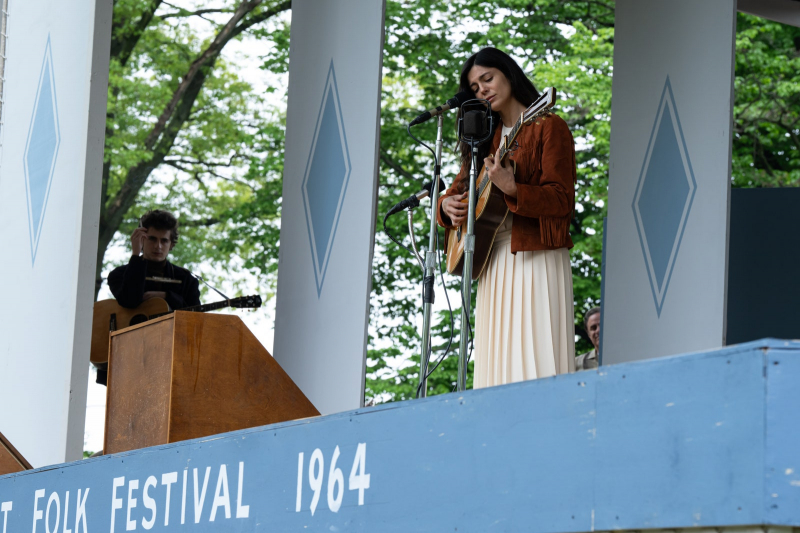
For Chalamet, however, this is the meatiest role he’s had in quite some time – perhaps even since his breakout in Call Me By Your Name some seven years ago – and he’s a thrill to watch: hunched over, hermetically contained, mumbly and entirely unsuited to the giant global platform he’s been thrust onto.
Dylan aficionados will, no doubt, weigh in on the accuracy of his voice, gestures, mannerisms and musical abilities, but I was most impressed by his ability to wrap so many specificities into his performance without ever making it feel distracting or overly mannered. His portrayal is an entirely committed, deep-seated, almost cellular embodiment, entirely different from anything he’s ever done before and a move which heralds the beginning of an exciting new chapter in his career, as he transitions from playing floppy-haired boys to real, complicated men. The script gives very little away about Dylan and his inner workings, but what we do learn, we learn from Chalamet’s posture, gait, the shiftiness of his gaze, and even the dazed manner in which he responds to being punched by a rabid fan.
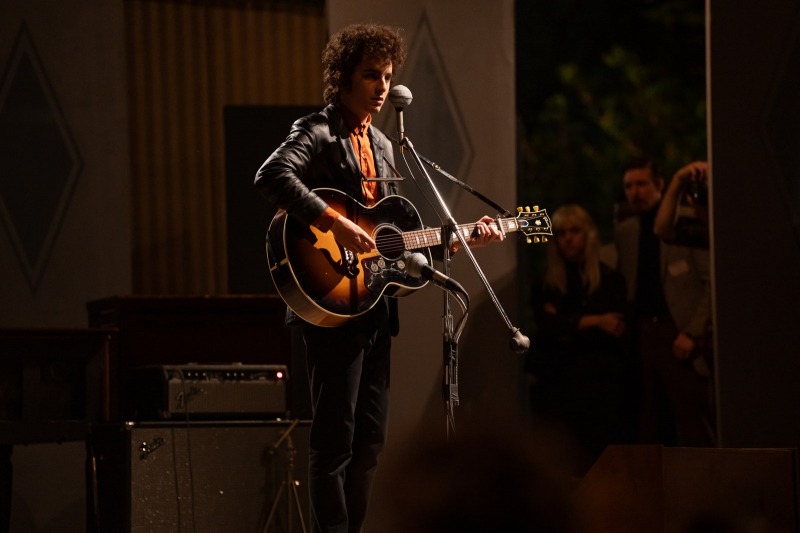
He seems to be, rightfully, guaranteed a Best Actor Oscar nomination come 2025, and if he were to win over the current favourite, The Brutalist’s Adrien Brody, it would be incredibly well deserved – a triumphant coronation for a heartthrob-turned-bonafide movie star who’s nimbly navigated everything from sweeping romances and coming-of-age comedies to period dramas, sci-fi blockbusters and exuberant musicals over the past decade and has, particularly in the last few years, visibly come into his own.
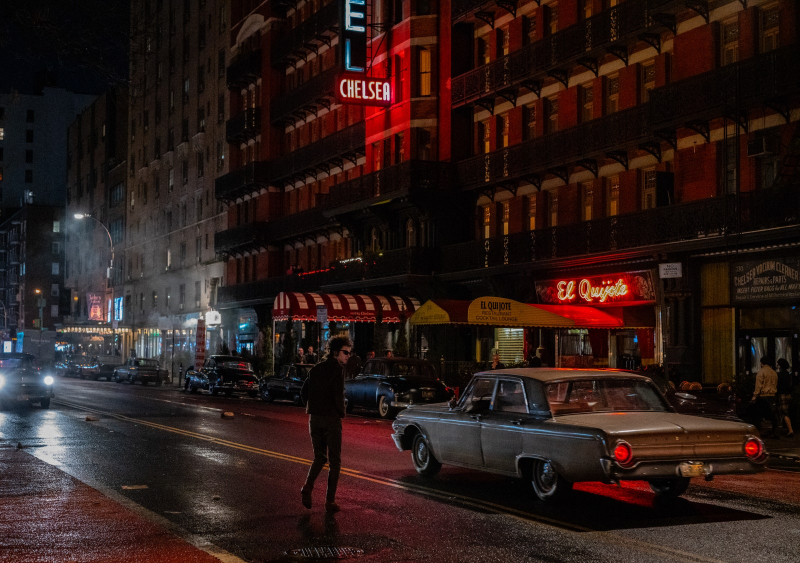
A Complete Unknown has many other things to recommend itself, too – the meticulous costuming and the production design which conjures up the neon-drenched, garbage juice-soaked streets of ’60s Manhattan, to name a few – but it’ll be remembered for this masterful turn, and that is the reason you shouldn’t miss it.
A Complete Unknown is in cinemas from 17 January 2025.



